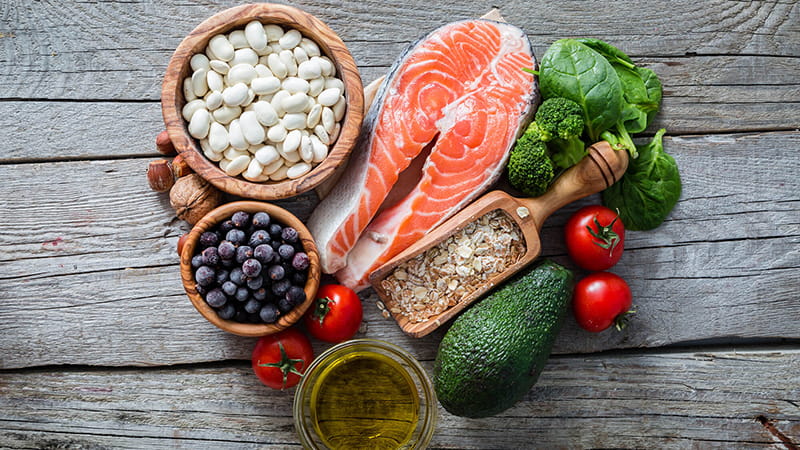
Your overall health can benefit from including these foods in your diet on a regular basis.
1. Leafy Green Vegetables:
Leafy greens like spinach, kale, and Swiss chard are high in vitamins, minerals, and antioxidants. They are low in calories and high in fiber, making them a good choice for weight loss. These greens are also strong in vitamin K, which is necessary for bone health, and folate, which supports brain function.
- Kale is regarded as one of the most nutrient-dense vegetables on the globe due to its high concentration of vitamins, minerals, and antioxidants.
- Collard greens feature thick leaves and a harsh taste. They’re one of the best sources of vitamin K and may help prevent blood clots and enhance bone health.
- Spinach is a popular leafy green vegetable that can be prepared in a variety of ways. It’s high in folate, which may help to prevent neural tube disorders like spina bifida during pregnancy.
- Cabbage has thick leaves and comes in a variety of colors. It possesses cancer-fighting properties and may be fermented into sauerkraut, which provides extra health advantages.
- Beet greens are edible green leaves found on the tip of beets. They’re full of nutrients, including antioxidants that may support eye health.
2. Berries:
Berries, including blueberries, strawberries, and raspberries, are not only delicious but also incredibly nutritious.
- Berries contain antioxidants such as anthocyanins, which may protect your cells from free radical damage.
- Berries, when ingested with high-carb foods or blended into smoothies, may boost blood sugar and insulin responsiveness.
- Berries include fiber, which may boost feelings of fullness while decreasing hunger and the number of calories absorbed from mixed meals.
3. Fatty Fish:
Fatty fish like salmon, mackerel, and sardines are excellent sources of omega-3 fatty acids, which are crucial for brain health and reducing the risk of heart disease.
- These fish are also rich in high-quality protein, vitamins, and minerals.
- Regular consumption of fatty fish can lead to improved overall health.
- A weekly intake of at least one serving of fish has been associated with a lower risk of heart attack and stroke.
4. Nuts And Seeds:
Nuts and seeds, such as almonds, walnuts, chia seeds, cashews, and flaxseeds, are packed with healthy fats, fiber, and essential nutrients.
- Nuts are high in fat, low in carbohydrates, and high in a variety of nutrients such as vitamin E, magnesium, and selenium.
- Nuts have been demonstrated to help people lose weight rather than gain weight.
- Nuts may lower total and “bad” LDL cholesterol and triglycerides while increasing “good” HDL cholesterol levels.
5. Whole Grains:
Whole grains, such as quinoa, brown rice, and oats, are less processed than refined grains and retain more nutrients.
- Whole grains can aid in blood sugar regulation, digestion, and the prevention of chronic diseases such as heart disease and type 2 diabetes.
- Whole grains provide a variety of essential elements such as vitamins, minerals, protein, fiber, and other beneficial plant compounds.
- Whole grains, especially when substituted for processed grains, may reduce your risk of heart disease.
- Whole grains, as part of a heart-healthy diet, may help lessen your risk of stroke.
- Decades of research suggest that whole grains are linked to a lower risk of obesity.
6. Greek Yogurt:
Greek yogurt, often known as “strained” yogurt, is manufactured by fermenting yogurt in tanks and then filtering whey and other liquids during the final processing steps. The technique produces a thicker product with a higher protein content.
- Greek yogurt is a nutrient-dense food high in protein, calcium, and probiotics.
- It improves intestinal health, bone strength, and muscular growth and repair.
- It is also lower in lactose and higher in protein than normal yogurt, making it a healthier option.
- It is a wonderful post-workout snack for athletes. Its high protein content may enhance muscle protein synthesis and recuperation.
7. Cruciferous Vegetables:
Cruciferous vegetable arugula, broccoli, Brussels sprouts, cabbage, cauliflower, kale, radish, turnips. They are known for their cancer-fighting properties and can also support heart health.
- These vegetables are low in calories and high in fiber, making them an excellent addition to a healthy diet.
- Broccoli contains multiple potent antioxidants that may support healthy cells and tissues throughout your body.
- Multiple studies have shown that cruciferous vegetables, such as broccoli, may have a cancer-preventative effect, though more research is needed.
- Eating broccoli may lower blood sugar and improve diabetic control. This is likely related to its antioxidant and fiber content.
In short, Incorporating these seven best foods into your daily diet can supply a variety of critical nutrients, enhance longevity, and support a healthy lifestyle. Remember to mix these foods with a well-balanced diet and moderate physical activity for the best health. Making these healthy choices will help you improve your overall health and quality of life.
Read: Miraculous Benefits Of Vitamin D: A Key To Wholesome Health




